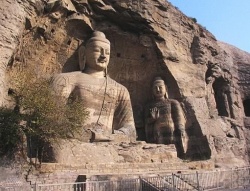Difference between revisions of "Esoteric transmission"
| Line 1: | Line 1: | ||
[[File:101213171724.jpg|thumb|250px|]] | [[File:101213171724.jpg|thumb|250px|]] | ||
| + | |||
| + | |||
| + | |||
| + | |||
| + | |||
| + | |||
| + | |||
<poem> | <poem> | ||
| − | '''[[Esoteric transmission]]''' - [[Vajrayana Buddhism]] is [[esoteric]], in the [[sense]] that the [[transmission]] of certain teachings only occurs directly from [[teacher]] to student during an [[initiation]] or [[empowerment]] and cannot be simply learned from a [[book]]. Many techniques are also commonly said to be secret, but some [[Vajrayana]] [[teachers]] have responded that secrecy itself is not important and only a side-effect of the [[reality]] that the techniques have no validity outside the teacher-student [[lineage]]. In order to engage in [[Vajrayana]] practice, a student should have received such an [[initiation]] or permission: | + | '''[[Esoteric transmission]]''' - [[Vajrayana Buddhism]] is [[esoteric]], in the [[sense]] that the [[transmission]] of certain teachings only occurs directly from [[teacher]] to [[student]] during an [[initiation]] or [[empowerment]] and cannot be simply learned from a [[book]]. Many [[techniques]] are also commonly said to be secret, but some [[Vajrayana]] [[teachers]] have responded that secrecy itself is not important and only a side-effect of the [[reality]] that the [[techniques]] have no validity outside the teacher-student [[lineage]]. In order to engage in [[Vajrayana]] practice, a [[student]] should have received such an [[initiation]] or permission: |
| + | |||
| + | If these [[techniques]] are not practiced properly, practitioners may harm themselves {{Wiki|physically}} and [[mentally]]. In order to avoid these dangers, the practice is kept "secret" outside the teacher/student relationship. [[Secrecy]] and the commitment of the [[student]] to the [[vajra guru]] are aspects of the [[samaya]] (Tib. [[damtsig]]), or "[[sacred]] bond", that protects both the [[practitioner]] and the [[integrity]] of the teachings." | ||
| + | |||
| + | The teachings may also be considered "self-secret", meaning that even if they were to be told directly to a [[person]], that [[person]] would not necessarily understand the teachings without proper context. In this way the teachings are "secret" to the [[minds]] of those who are not following the [[path]] with more than a simple [[sense]] of {{Wiki|curiosity}}. | ||
| + | |||
| − | |||
| − | |||
</poem> | </poem> | ||
{{W}} | {{W}} | ||
[[Category:Buddhist Terms]] | [[Category:Buddhist Terms]] | ||
[[Category:Esoteric Buddhism]] | [[Category:Esoteric Buddhism]] | ||
Latest revision as of 10:30, 4 May 2023
Esoteric transmission - Vajrayana Buddhism is esoteric, in the sense that the transmission of certain teachings only occurs directly from teacher to student during an initiation or empowerment and cannot be simply learned from a book. Many techniques are also commonly said to be secret, but some Vajrayana teachers have responded that secrecy itself is not important and only a side-effect of the reality that the techniques have no validity outside the teacher-student lineage. In order to engage in Vajrayana practice, a student should have received such an initiation or permission:
If these techniques are not practiced properly, practitioners may harm themselves physically and mentally. In order to avoid these dangers, the practice is kept "secret" outside the teacher/student relationship. Secrecy and the commitment of the student to the vajra guru are aspects of the samaya (Tib. damtsig), or "sacred bond", that protects both the practitioner and the integrity of the teachings."
The teachings may also be considered "self-secret", meaning that even if they were to be told directly to a person, that person would not necessarily understand the teachings without proper context. In this way the teachings are "secret" to the minds of those who are not following the path with more than a simple sense of curiosity.
